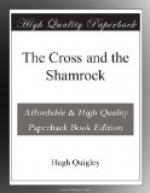“Yes, old fellow,” said the young man at the table; “but if that will was disputed, which would you do,—submit it to an able lawyer, or go into court yourself without advice or counsel? You surely would fee a lawyer, if money or property was at stake. Well, you ‘omadawn,’” said our young stranger, “don’t you see that, though that Bible is the will, the devil, and his small heretical attorneys—Luther, Calvin, Wesley—dispute the will, and the Church is the able advocate, and judge, too, that will conquer the devil, and put to shame his agents, and secure the stake, which is heaven, and the salvation of the soul? Let the child alone,” said he, boldly, “as you see she doesn’t want your biblical pills, or, ‘be the tinker that mended Fion-vic Couls’ pot,’ I will turn you out of doors, if I were to hang for it after. Let the child alone this minute,” said he, firmly.
“Who are you, sir?” said the indignant parson, turning to view his antagonist. “How dare you interrupt me when I am not addressing you?”
“I am an Irishman and a Catholic,” said he; “and furthermore, if you wish to know my name, it is, sir, Murty O’Dwyer, Tipperary man and all.”
The reader will recollect the rollicking young attendant who drove Father O’Shane in the snowdrifts from Vermont, a specimen of whose oratory we have given in a preceding chapter. The antagonist of Parson Grinoble was no other than the same young man. He had rambled up to this neighborhood in search of work, and hearing that Mr. Prying was in need of a hay hand, he waited his return from the Vermont State fair.
The minister Grinoble returned to the parlor to report progress to Amanda, and to represent the controversial rencontre which he had with O’Dwyer, while Murty learned with wonder and indignation from Bridget, that they were the children which cost Father O’Shane so much vain search, and that they were kept in continual annoyance by all sorts of male and female religious quacks and mountebanks, all bent on the work of perversion. “Oh, thunder and age!” said he; “and ye are widow O’Clery’s children, God rest her soul! What a murthur Father O’Shane could not find ye out before he died! The Lord have mercy on him.”
“We have heard he died,” said Bridget. “Is it long since, sir?”
“Almost two years. He published ye in the Boston Pilot, and all the newspapers. He even offered a reward for yer discovery. Oh, mille murther! what a pity I did not know ye were so near home!”
“I suppose uncle wrote to him, and sent us money to take us home again?” added pensive Bridget.
“Money!” said the disinterested young man; “what money? I would give all I earned since I came to this queer country myself to have ye found out. We all thought ye were lost, drowned, or killed on the railroad cars. I am glad I have found ye out; ye will have to leave right off. I will take ye away myself to-morrow.”




